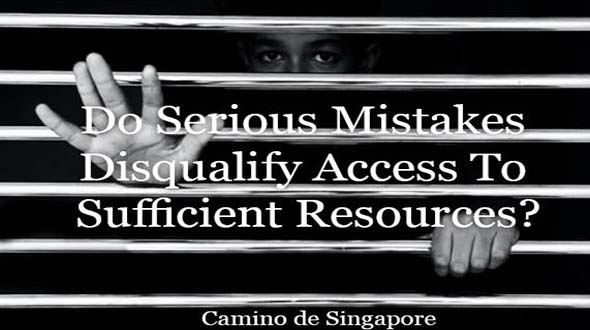No products in the cart.

Photo by: https://unsplash.com/@pandavtank
When someone hurts us badly, it is not an easy thing to forgive or to give that person a second chance. In our mind, they do not deserve our forgiveness. They are not deserving of kindness and understanding. Individually and as a society, we tend to lean towards this way of thinking. As such, it is often challenging to talk about giving those who have committed a crime and are incarcerated in prison a second chance by giving them resources to better their lives. Having known that they are criminals, we distance ourselves from them and ignore them.
I remember an encounter with an ex-offender when I first started work at Caritas Singapore. He knocked on the door of the office, and then I opened it and welcomed him in. At that moment, I did not know who he was. Upon entering the office, he introduced himself as one who was very recently released from prison. I froze on the spot. I was the only one in the office at that time. I must admit that I did not think of very kind thoughts at that moment. It was my first time being face-to-face with someone who introduced himself openly to me as an ex-offender. Even though I knew that all persons are made in the image of God and loved by Him, that did not stop me from judging him.
Yet, he was a gentle person. At that time, he was exhausted and was just seeking a place where he could rest and get something to eat or drink. Having given him a cup of hot Milo and biscuits from our office pantry, I led him to a sofa where he could drink, eat and rest. Maybe the Holy Spirit was gently nudging me that day. As soon as he made his request, I saw him in a new light. He was no longer someone who had to pay for his crime and be forever condemned, but someone who was in need of a gentle word and some support.
As I came to realise, it is not always easy to see ex-offenders as persons who deserve access to resources like food, education, work support, etc. just like everyone else. Yet, the Church’s social teaching on the universal destination of goods states that the resources of the world are meant for everyone’s use. It is not a ‘feel-good’ idea but an invitation to commit to the sustenance and growth of all persons. For most of us, it may be easier to want to give to needy children as compared to those who have committed serious crimes. But can we answer the call, as a society, to see ex-offenders, inmates and those who are facing criminal charges as persons who also need resources to live and develop just like everyone else?
Recently, it was reported that the Teochew Foundation has stepped up to support the education of inmates. This additional funding and resource brings hope and encouragement to those who seek to better themselves through education and also provides some relief to those released from prison with some living allowances. This generous gift is a demonstration that there are those of us who recognise that inmates need help and resources too.
This Eastertide reminds us that Christ first loved us, even when we are undeserving of His love. To respond to this divine love, we are called to bring this gratuitous love to others. Even if the world says that certain persons are undeserving of love, resources and support, we can choose the path of love and see that God loves them too.
Gail Ng handles Special Projects at Caritas Singapore. The study of earth processes has been one of her pet interests since young, and she suspects this is why she loves the colour green.
